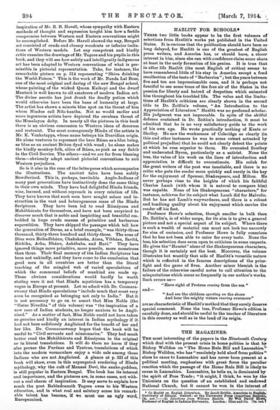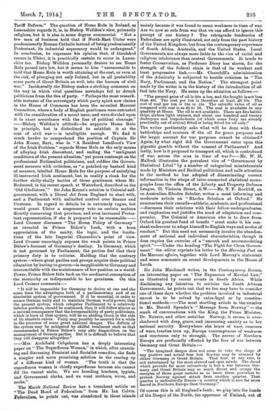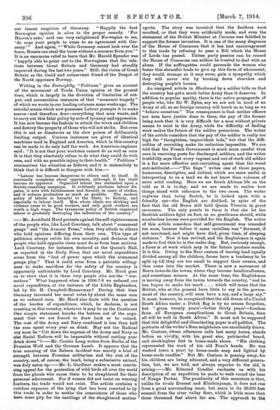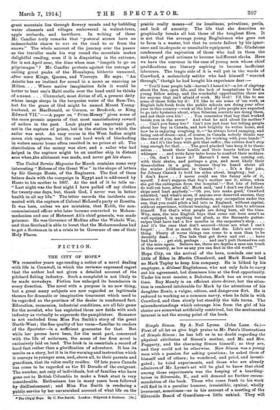THE MAGAZINES.
THE most interesting of the papers in the Nineteenth Century which deal with the present crisis in home politics is that by Bishop Welldon on " The Home Rule Bill and Lancashire." Bishop Welldon, who has " resolutely held aloof from politics " since he came to Lancashire and has never been present at a political meeting, emphasizes with great force the peculiar reaction which the passage of the Home Rule Bill is likely to cause in Lancashire. Lancashire, he tells us, is dominated by the spirit of Free Trade; "it might, I think, be won by the Unionists on the question of an established and endowed National Church, but it cannot be won in the interest of
• (1) Madill on English Literature. By Jacob Zeitlin, Associate in English, lJniversity of Illinois. Orford : at the University Press (American Branch). Ds. net.] —(2) Selections from William Ifaslitt. By Will David Howe, Professor of English in Indians University. London Gina and Co. 62. net.1
Tariff Reform." The question of Home Rule in Ireland, as Lancashire regards it, is, in Bishop Welldon's view, primarily religious, but it Is also in some degree commercial. "Not a few men of business hold that if North-Feat Ulster were predominantly Roman Catholic instead of being predominantly Protestant, its industrial supremacy would be endangered." In conclusion, be expresses his opinion that, if bloodshed occurs in Ulster, it is practically certain to occur in Lanca- shire too. Bishop Welldon personally desires to see Home Rule passed into law, but it seems to him "unreasonable to bold that Home Rule is worth attaining at the cost, or even at the risk, of plunging not only Ireland, but in all probability some parts of Great Britain as well, into the horrors of civil war." Incidentally the Bishop makes a striking comment on the way in which vital questions nowadays fail to detach politicians from the ties of party. "Perhaps the moat remark- able instance of the sovereignty which party spirit now claims in the House of Commons has been the so-called Marconi Committee, where a body of English gentlemen were entrusted with the consideration of a moral issue, and were divided upon it in exact accordance with the line of political cleavage." ---Bishop Welldon's attitude—he supports Home Rule in principle, but is disinclined to establish it at the cost of civil war — is intelligible enough. We find it much harder to comprehend the position of Captain Sir John Keane, Bart., who in "A Resident Landlord's View of the Irish Problem" regards Home Rule as the only means of allaying Irish discontent, and ending the "malignant conditions of the present situation," yet pours contempt on the professional Nationalist politicians, and riddles the Govern- ment measure with criticism, as "a patched-up bastard kind of measure, labelled Home Rule for the purpose of satisfying ill-instructed Irish sentiment, but in reality a cloak for the further chilly-shally tactics of those gentlemen whom Mr. Redmond, in his recent speech at Waterford, described as the 'Old Gladiators?" Sir John Keane's solution is Colonial self- government, with a liberal dot from England to start with, and a Parliament with unlimited control over finance and Customs. In regard to details he is extremely vague, but would grant Ulster a suspensory veto on certain matters directly concerning that province, and even increased Protes- tant representation, if she is prepared to be reasonable.— Lord Cromer discusses "The Home Policy of Germany" as revealed in Prince Billow's book, with a keen appreciation of the sanity, the logic, and the limita- tions of the late Imperial Chancellor's point of view. Lord Cromer unerringly exposes the weak points in Prince Bfilow's forecast of Germany's destiny. In Germany, which is not governed by Parliament, the parties feel that their primary duty is to criticise. Holding that the contrary system—where great parties and groups acquire their political education by having to govern—is inapplicable to Germany and irreconcilable with the maintenance of her position as a world- Power, Prince Billow falls back on the mediaeval conception of the monarchy as indispensable to her greatness. On this Lord Cromer comments " It will be impossible for Germany to derive at one and the same time the advantages both of a parliamentary and of an absolutist system of government. If it be essential, in order to secure German unity and to maintain German world-power, that the present system, which relegates Parliament to a relatively inferior position, should be continued, then it will follow almost as a natural consequence that the irresponsibility of party politicians, which is born of that system, will be an abiding thorn in the side of its absolute rulers. Unity may possibly be secured for a while in the presence of some great national danger. The defects of the system may be mitigated by skilful treatment such as that recommended in Prince Bfilow's very able disquisition on the management of German parties. But it is difficult to believe that they will disappear altogether."
—Mrs. Archibald Cokinhonn has a deeply interesting paper on " The Supertluoua Woman," in which, after examin- ing and discussing Feminist and Socialist remedies, she finds a simpler and more promising solution in the rearing up of a different kind of woman. "The truth is that the superfluous woman is chiefly superfluous because she cannot fill the vacant niche. We are breeding teachers, typists, and Government clerks, and we want mothers, wives, and
cooks."
The March National Review has a trenchant article on "The Dead Hand of Federalism" from Mr. Ian Colvin.
rodstralisto, he points out, wee abandoned in these islands
mainly because it was found to mean weakness in time of war. Are we now so safe from war that we can afford to ignore this precept of our history P The retrograde tendencies of Federalism are aptly illustrated, not only from the past history of the United Kingdom, but from the contemporary experience of South Africa, Australia, and the United States. Local Governments are always more liable to the vice of racial and religious intolerance than central Governments. It tends to foster Conservatism, as Professor Dicey has shown, for the strength of the federal chain is that of its weakest and least progressive link.—Mr. Churchill's administration of the Admiralty is subjected to hostile criticism in " The. Navy, Parliament, and the Nation." The strongest point made by the writer• is in the history of the introduction of oil fuel into the Navy. He sums up the situation as follows :— "The present price of oil is 90a a ton, and the freight is not lase than 40s. The cost per ton is therefore at least £6 10s. The cost of coal per ton is 14s. or 15s. The calorific value of oil as compared with coal is as 25 to 16. The coal is available in any quantity at Rome. The oil is not available. There are five battle. ships, sixteen light cruisers, and about one hundred and twenty destroyers and torpedo-boats (of which some forty are already practically out of action) fitted or being fitted for oil only."
The writer pertinently asks what will be done with these battleships and cruisers if the oil for peace purposes and the larger amount for war purposes cannot be obtained ? Again, by what right did the Government enter upon this gigantic gamble without the consent of Parliament ? And lastly, how is it proposed to transport oil, which is contraband of war, across the seas in time of war. P—Mr. W. H. Malloek illustrates the prevalent vice of " Government by Statistical Libel" by a number of categorical misstatements made by Ministers and Radical politicians, and calls attention to the method be has adopted of disseminating correct information in the shape of inter-connected statistical mono- graphs from the office of the Liberty and Property Defence League, 25 Victoria Street, S.W.—Mr. T. F. Rockliff, an ex-Australian Rhodes Scholar, writes a most informing and moderate article on " Rhodes Scholars at Oxford." He summarizes their records—athletic, academic, and professional —discusses their relations with their fellow-undergraduates, and emphasizes and justifies the need of adaptation and com- promise. The Colonial or American who is to draw from. Oxford his greatest fund of benefit " must make it his con- stant endeavour to adapt himself to English ways and modes of conduct?' But this need not necessarily involve the abandon. meat of national and individual characteristics, though it does require the exercise of a "smooth and accommodating spirit."—Under the heading "The Fight for Clean Govern- ment " the editor reprints his letter to the Morning Post on the Marconi ofaire, together with Lord Murray's statement and some comments on recent developments in the House of Lords.
Sir John Macdonell writes, in the Contemporary Review, an interesting paper on " The Expansion of Martial Law," as illustrated by recent events in South Africa. While disclaiming any intention to criticize the South African Government, he points out that we too may have to consider one of these days whether the problem involved in industrial unrest is to be solved by extra-legal or by constitu. tional methods.—The most startling article in the number is Mr. Harold Spender's " Message from Norway " — the result of conversations with the King, the Prime Minister, Dr. Nansen, and other notables. Norway, it seems, is over- shadowed with deep, grave, and increasing anxiety as to her national security. Everywhere she hears of wars, rumours of wars, treaties torn up, Europe contemptuous of weakness and courteous only to strength. The nerves of Northern Europe are profoundly affected by the fear of war between Germany and Great Britain:— "The imagined danger does not seem to take the shape of any positive and actual fear lest Norway may be annexed by either Germany or Great Britain. That fear, at any rate, ie not entertained by the most shrewd and open minds. The dread which prevails far more extensively is lest a war between Ger- many and Great Britain may so much divert and occupy the energies of those great nations as to leave them powerless to protect Norway against attack from another quarter. That quarter is undoubtedly Russia—a country which is now far more feared in Northern Europe than Germany."
Of course this is all England's fault; we play into the bands of the Despot of the North, the. oppressor of Finland, Out of our insane suspicion of Germany. "Happily the best Norwegian opinion is alive to the proper remedy. For Heaven's sake,' said one very enlightened Norwegian to me, do urge your people to come to an agreement with Ger- many." And again, "‘ While Germany cannot look over the fence, Russia can steal the horse without a murmur from you. " It is an enormous relief to learn that Mr. Harold Spender was " happily able to point out to the Norwegians that the rela- tion& between Great Britain and Germany bad steadily improved during the last two years." Still, the vision of Great Britain as the timid and subservient friend of the Despot of the North oppresses Norway.
Writing in the Fortnightly, "Politicos" gives an account of the movement of Trade Union opinion at the present time, which is largely in the direction of limitation of out- put, and accumulates instances of that "economic tragedy" of which we wrote in our leading columns some weeks ago. The suicidal mania which now possesses Labour prompts it to make scarce—and therefore dear—everything that man wants, and to carry out this fatal policy by acts of tyranny and oppression. It has now become the fashion to attack the wives and children and destroy the property of those who will not strike. But even this is not so disastrous as the slow poison of deliberately limiting output. Curious instances are given of identical machines used in England and America, which in this country can be made to do only half the work. An American engineer said : "It is not that your workmen cannot do as well as ours It is that they absolutely refuse to do what they could do with ease, and with no possible injury to their health." "Politico" summarizes the situation as follows, and it is melancholy to think that it is difficult to disagree with him "labour has become dangerous to others and to itself. It constantly complains about oppression, although it has itself become an oppressor. Organized labour has embarked upon a Society-smashing campaign. It recklessly produces labour dis- putes, it acts with faithlessness and ferocity in cases of strikes, and it reduces production as much as possible. The modern policy of labour is harmful to the State, to Society, and especially to labour itself. Men whose ideals are shirking and violence cease to be good workers, and only good workers are worth a high wage. The tyrannous policy of British organized labour is gradually destroying the industries of the country."
—Mr. Archibald Hurd protests against the self-righteousness of the people who, like Lord Courtney, talk about " armament gangs" and "the Armour Press," when they allude to others who hold opinions differing from their own. This type of politician always extols his own morality, and declares that people who hold opposite views must do so from base motives. Lord Courtney, for instance, declared at the Queen's Hall, as reported in the Daily News, that our naval expenditure arose from the " lust of power upon which the armament gangs play." That it could arise from a patriotic willing- ness to make sacrifices for the safety of the country is apparently unthinkable by Lord Courtney. Mr. Hord goes on to show that it is these very people who are the " war- makers." What happened when in 1906-7-8 we reduced our naval expenditure, at the instance of the Little Englanders, led by Sir H. Campbell-Bannerman ? During that time Germany increased her naval votes by about the same sum as we reduced ours. Mr. Hurd also deals with the question of the burden of expenditure, which, he declares, is not crushing in this country, whatever it may be on the Continent One supple statement knocks the bottom out of the argu- ment that we are forced to draw hack or be ruined. The cost of the Army and Navy combined is less than half the sum spent every year on drink. May not the Radical cry soon be " Cut down the expense of the Army and Navy or else Social Reform will be impossible without cutting your drink down " F—Mr. Crozier Long writes from Berlin of the Prussian Wolf and the German Lamb. It appears that the true meaning of the Zabern incident was merely a trial of strength between Prussian militarism and the rest of the country, and, of course, the lamb, being a submissive animal, was duly eaten up.—Mr. L. Gardiner makes a most convin- cing appeal for the protection of wild birds all over the world from the ghouls who cause them to be slaughtered for their personal adornment. For if women did not insist on wearing feathers, the trade would not exist. The article contains a ruthless exposure of the lying that has been resorted to by this trade in order to Boothe the consciences of those who Lave some pity for the nestlings of the slaughtered mother egrets. The' story was invented that the feathers were moulted, or that they were artificially made, and even the statement of the British Minister at Caracas was falsified to support the former invention. It is one of the many disgraces of the House of Commons that it has lent encouragement to this trade by refusing to pass a Bill which the House of Lords has passed. Unless party passion can be roused the House of Commons can seldom be trusted to deal with an abuse. If the suffragettes could persuade the women who foster this shameful trade to give up this form of adornment, they would, strange as it may seem, gain a sympathy which they will never win by burning down churches and destroying people's houses.
An unsigned article in Blackwood by a soldier tells us that the country bas got a much better Army than it deserves. In addition to popular apathy, there is the active propaganda of people who, like Sir W. Byles, say we are not in need of an Army at all, as no foreign country will touch us so long as we " behave ourselves." The consequence is that neither officers nor men have justice done to them, the pay of the former being such that it is very difficult for a man without private means to exist in the Army, while the difficulty of finding work makes the future of the soldier precarious. The writer of the article considers that the pay of the soldier is really too high for "thoughtless, improvident lads," but that the diffi- culties of recruiting make its reduction impossible. We are told that the French Government is much more careful than ours in reserving posts for discharged soldiers, and the writer truthfully says that every vagrant and out-of-work old soldier is a far more effective anti-recruiting agent than the worst antionilitarist.—" The Sage " writes one of those papers, humorous, descriptive, and critical, which are more useful in interpreting to us a land we do not know than volumes of more solid reading. Here we see South African life on the veld as it is to-day, and we are made to realize how things stand with reference to the two races. The writer explains that, being Scotch, he is looked upon with a friendly eye—the English are disliked, in spite of the fact that the old Boers still hold Queen Victoria in great reverence. The only puzzle to them is that she let her Scottish soldiers fight on foot, as no gentlemen should, while numberless horses were provided for the English. The writer of this article considers that self-government was conceded too soon, because before it came racialism was "dormant, if not moribund, and might have died, given time, of sleeping sickness." Now it has revived, and the Englishman is again made to feel that he is the under-dog. But, curiously enough, a force is at work which may in the future produce results. It is this. Owing to the Boer custom of leaving land equally divided among all the children, farms have a tendency to be split up till they are too small to support their owners, and thus come into the market. There is now a movement of Boers towards the towns, where they become handicraftsmen, and sometimes miners. At the same time, the Englishman is moving away from the towns towards the country, "and he has begun to make his mark . . . which will mean that the British, who at the present have little to say in the govern. ment of the country, will soon have a say, and a large say." It must, however, be recognized that the old dream of a United South Africa under a Dutch flag is by no means forgotten, but " given twenty years'—better thirty years'—freedom from all European complications to Great Britain, than all will be well in South Africa." It must not be supposed that this delightful and illuminating paper is all politics. The portraits of the writer's Boer neighbours are excellently drawn. Mr. Coatzee, whose afternoon calls last many hours, stands before us vividly, with his great size, patriarchal beard, and stockingless feet in home-made shoes. "His clothing represented the work of his old Fran's hands. He was washed (once a year) by home-made soap and lighted by home-made candles." But Mr. Coatzee is passing away, for his children are being educated, and a very different genera- tion, but, we are told, not always superior to the old, is arising.—Mr. Edmund Candler enchants us with his description of an expedition he made to walk round the base of Nanga Parbat. The peculiarity of this mountain is that, unlike its rivals Everest and Kinchinjunga, it does not rise from a great surrounding mass, but soars to its 26,620 feet summit from the river valley floor, which is little more than three thousand feet above the sea. The approach to the
great mountain lies through flowery meads and by bobbling water channels and villages embowered in walnut-trees, apple orchards, and hawthorn. In writing of these Mr. Candler truly remarks that "pastoral scenes have an indescribable charm to oas on the road to or from the snows." The whole account of the journey over the passes as the traveller made his way round the mountain makes delightful reading, even if it is disquieting in the extreme, for is not April near, the time when man " longeth to go on pilgrimages " ? Mr. Candler protests against the outrage of calling great peaks of the Himalayas, hitherto unnamed, -after mere Kings, Queens, and Viceroys. He says : "An Asiatic has an instinct for sound in a name as unerring as . Where native imagination fails it would be better to beat one's Haiti coolie over the head until he thinks 'of a name. . . . Chumulari, most divine of all, a present deity whose image sleeps in the turquoise water of the Bam-Tso, but for the grace of God might be named Mount Young- husband, or MacDonald, or Curzon, or Brodrick, or King Edward VII."—A. paper on " Prize-Money" gives some of the more prosaic aspects of that most unsatisfactory reward of sailors in the past. Luck played an important part, not in the capture of prizes, but in the station to which the .sailor was sent. An easy cruise in the West Indies might mean rich captures, but the real hard work of blockading in waters nearer home often resulted in no prizes at all. The 'distribution of the money was slow, and a sailor who had lelped in the capture might be on another ship in distant seas when,the allotment was made, and never get his share.
The United Service Magazine for March contains some very interesting "Echoes of the Great War" in the shape of letters • by Sir George Hoste, of the Engineers. The first of these letters deals with the campaign in Egypt and is addressed by Hoste to his mother in 1807. At the end of it he tells us: Last night was the first night I have pulled off my clothes for twenty-one days, but, thank God, I never was in better 'health in all my life." The letter records the incidents con- nected with the capture of Colonel MoLeod's party at Rosetta. It was here, unless we are mistaken, that Keith, the non- commissioned officer who later became converted to Moham- medanism and one of Mehemet Ali's chief generals, was made prisoner. He was Governor of Medina after the Wahabi War, and thus Scotland is able to boast that the Mohammedans bad -to get a Scotsman in at a crisis to be Governor of one of their Holy Places.

















































 Previous page
Previous page